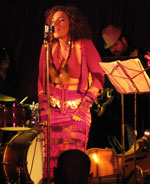Anouch: an incredible singer!
On November 10, 2009, AnOuCh hiGhsOuL, a French-Armenian singer, took her audience at Zinc bar in NYC’s West Village, on a journey. As soon as the drumming began, mixing with the sounds of saxaphone, cello, duduk and keyboard, the energy in the room began to transform and we inadvertently became a part of something greater, perhaps a solution to the craziness of experience in our world. This, it seems, is one of Anouch’s primary goals, what she wants to share with her audience. In an interview a few days after the show, she expressed her desire to have the “audience experience something different of themselves.”
For Anouch, music is the link to a spirituality that opens doors for others to learn about their own history, of exile and roots, of identity, of eroticism and love. Once the singing began, merging, sometimes going against the music, Anouch’s voice became that door, and for those of us in the audience who could not help walking through, a host of emotions began to come up to our throats. For myself, the song “groong” took me on a journey into my own exile as an immigrant in the United States, as well as into the memory of genocide that is unwittingly a part of me. “Music was my freedom,” Anouch told me when asked about how she came to be a singer. She started to sing in a gospel choire at a young age and was influenced by her father’s mixed taste in music. From jazz, to Afro-Cuban rhythms, to traditional Armenian songs, Anouch was exposed to a wide range of music that eventually came to symbolize her own evolution and style as a singer. After traveling to Cuba, Anouch learned even more about the mix of Spanish, African, Chinese, Yoruba music that was a big part of the culture of the region. “I mix traditions,” she said, “It has to do with my identity, which is multiple.” As someone who is repeatedly told that she is not “pure” because she is not fully Armenian, or that her music does not give justice to established Armenian traditions, this intertwining of music and identity is a way for Anouch to be who she is in the most honest and truest possible sense. What she aims to do with her voice is reach out to humans no matter what ethnicity, or age, or religion. “As I mix jazz, and soul, and world music, I have all kinds of audiences,” she said. “I do not fit in a box.” This is a difficult disposition to be in, especially as someone who is unintentionally carrying a representative role in the Armenian community. For Anouch who feels deeply connected to her Armenian roots, her music is a way to spread this Armenian culture and spirituality. “And to spread it you have to open yourself,” she said. She also went on to explain, “My purpose is to connect the vertical link (past, present, future) to the horizontal one (there, here, over-there), meaning how do I connect my history (and story) to my future and how do I share it with others? All my philosophy and Art is based on this: the connection is at the meeting point, the space and time of creation, the present.” In a mostly traditional musical culture, Anouch often has a hard time finding a duduk player who will share in this vision of evolution with her. “I want a mugham specialist as well as a creative musician who can find his way into other rhythms, so please if you are a new spirit duduk player just call me, I have a place for you,” she concluded. Toward the end of the interview Anouch expressed to me that she is universally oriented. She went on, “When I did the song about genocide I also related it to slavery, to Native Americans.” Music, in its universality, has the power to connect and communicate across all differences, even among Armenians in various parts of the world. In between songs during her incredible performance at Zinc bar, Anouch spoke of the history of Armenians in Ottoman Turkey and how healing cannot happen on either side without recognition of what took place. Perhaps part of the healing happens when not only our Turkish brothers and sisters, but also our Armenian brothers and sisters open themselves up to truth, and understanding, and music. On that note, the encounter of Eastern music and Western music can be the starting point for this difficult task. And what better place to start if not at this crossroads? (www.myspace.com/anouchhighsoul)
 Videos
Videos Photos
Photos

Write a comment